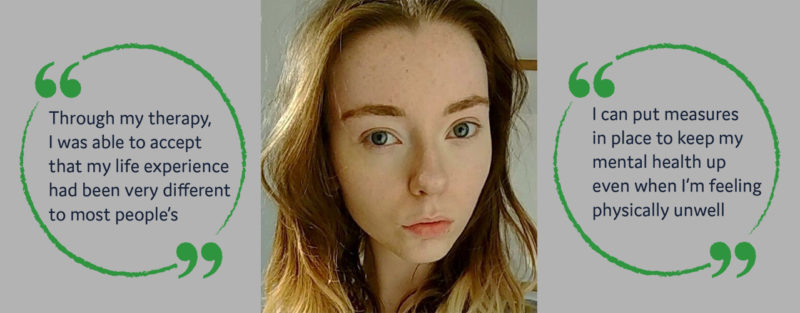
How Talking Therapy Helped Lucy

Lucy, a long-term sufferer of two rare health conditions, spoke to our communications team about the repercussions they have had on her mental health and how talking therapy with Community Living Well helped her to reframe her perception of herself and embrace life with her long-term conditions.
The Community Living Well Psychological Therapies service offers talking therapy or counselling that can help you if you are feeling stressed, worried, anxious or low in mood. We offer a range of therapy options, all of which are effective treatments recommended by the National Institute for Clinical Excellence.
To sign up to the service, please click here
Tell us about your long-term health conditions
I have two long-term physical health conditions and two long-term mental health conditions. They all impact each other. My physical health conditions include Gastroparesis which is a paralysis of the stomach. I was hospitalised on and off for four years with this digestive illness and had to have a feeding tube at one point.
My neurological condition (Suna syndrome) is similar to epilepsy, with symptoms that imitate a migraine condition. It causes sharp bursts of pain throughout the head and face randomly (up to 100 times a day). Both conditions physically impact my life and it’s very hard to live a day-to-day life with either of them. I also have long term depression and anxiety that I’ve had since I was young. I tend to find that the depression comes on during extreme bouts of physical pain.
What led you to seek talking therapy with Community Living Well?
I had just undergone a major operation for my Gastroparesis and was having quite a difficult time. The prospect of going back into education had left me feeling stressed. This triggered severe anxiety, which coupled with the fact I was experiencing intense pain, had a significant impact on my depression levels. I felt like I needed support that I wasn’t getting otherwise.
Tell us about your experience
I had various therapies prior to this that were associated with pain management – some helped and some didn’t. This was the first time I was seeing a therapist because I felt like I needed active support specifically for my mental health. Life before I had therapy feels very different to life afterwards and I found the sessions incredibly helpful. Getting things off my chest and having someone who would listen to me was very beneficial as I felt like I had been living in my own head.
I was aware of techniques such as writing things down and talking to people I trusted but these weren’t actions that I had ever implemented in the past. In the lead-up to the therapy, I had been experiencing anxiety at the thought of leaving school due to my health conditions. The support I received helped me to realise that this wasn’t an ending to my dreams, but instead an opening to other pursuits.
Did you overcome any specific challenges during talking therapy?
One of the main reasons I went to therapy was because I had been struggling a lot with the fact that I had missed so much of my education. This made me feel like I wasn’t good enough because I wasn’t able to deal with my illnesses or accomplish the same academic achievements as those around me. Through my therapy, I was able to accept that my life experience has been very different to most people’s. My abilities are different as I haven’t had the same experiences and opportunities as other people.
My therapist helped me see that this didn’t mean I wasn’t able to do certain things, it just meant that they may take a different form for me. I learnt that it’s okay for me not to succeed at everything as there will be other opportunities out there. This was a huge revelation to me because before that I had a very specific life plan mapped out. It was liberating to be able to put that to one side and thrive outside of my regimented idea of what my life was going to be like.
Does having a long-term condition challenge you in any way?
One of the topics I covered in therapy was my feeling of unease at the thought of no longer being sick. I had been ill for such a long time that I didn’t really know who I was outside of my illness. I still struggle with this – who I am when I’m not in pain and crying on the floor – because it’s such a huge part of my identity. Through healing and accepting my conditions, I have learnt that I have lots of other facets and that my illnesses don’t define me.
What was your understanding of the connection between your physical and emotional health before and after your talking therapy?
I always knew there was a connection between my physical and mental health as both would deteriorate at the same time. The sicker I was the more depressed I felt and the more likely I was to experience dark thoughts. After having therapy, I realised that I can manipulate my better thoughts and experiences. If I can recognise that my mental health suffers when my physical health does, I can put measures in place to keep my mental health up even when I’m feeling physically unwell.
Do you have a plan for continuing to implement what you have learned?
After therapy, I started having a routine for the first time. I always thought a routine would never work for me but I now have a solid idea of what my day is going to look like every morning and checklists of what I want to do. By keeping my brain occupied, it allows me to stay on top of my physical and mental health needs.
What advice would you give to others who are struggling with psychological issues?
You’re never as alone as you think you are. There will be people out there who not only understand but can help you overcome what you are going through, even if they can just make it an easier burden to shoulder. Taking that first step is the hardest part but once that’s over you have done the most difficult thing there is to do and the only way is up.
Community Living Well is a mental health service for those registered with a GP in the Royal Borough of Kensington and Chelsea, or the Queen’s Park and Paddington areas of Westminster. The services on offer include talking therapies, support groups, help with employment and support with debt, housing and benefits issues. Self-referrals can be made here. For more information please call 020 3317 4200.
This story was originally published in the Spring 2019 edition of the Community Living Well magazine. It has been edited for website purposes. Subscribe today to receive inspirational stories of recovery, just like Jenny and Steven’s, straight to your inbox, four times a year!
Author: Tamsin Cogan
Posted on: 22nd August 2019



